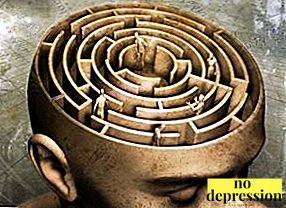A person always communicates not only with other people, but also with himself.
This happens when thinking about some ideas, presenting conversations with someone, discussing topics that concern him greatly, and so on.
Intra-personal conflict, examples of which are encountered quite often, during such dialogues with oneself is quite a serious phenomenon.
Conflict can have different types, and you need to understand what this concept means, and what are the reasons for its occurrence.
Concept

What is intrapersonal conflict in psychology?
Intrapersonal is called man's communication with himself.
Intra-personal conflict is understood as a contradiction arising from such communication.
This conflict is perceived by a person as serious problem which requires the fastest possible solution.
Inability to resolve a situation or lack of ability to make a decision can provoke various violations, for example, insomnia due to constant reflection.
Intrapersonal conflict can direct a person to one of the following scenarios:
- The problem will direct him to self-development, he will mobilize forces, and he will take measures to improve his life.
- The problem, on the contrary, will make it slow down, which will disrupt the process of development and self-knowledge.
In an intrapersonal conflict, a clash of two or more interests, needs, or desires that are opposite in meaning occurs.

Man difficult to make a decision and make a choice.
By taking one side, he loses the advantage of the other side.
Awareness of this leads to doubts, hesitations, inability to make a decision.
Depending on the importance of the issue that a person cannot solve, a conflict can provoke various problems and disorders.
Being in a confrontation with himself, a person raises risk of developing various pathologies, both psychological and physiological. Having solved the problem, he takes the path of healing and release from such adverse reactions.
Causes
The reasons that provoke intrapersonal conflicts, can be viewed from three sides:
- from the internal contradictions of the person;
- from the external position occupied by them in a particular social group;
- with its external position in society at large.
Internal

If individual can't find harmony within yourself, then there may be contradictions between the elements of the structure of his personality.
Internal conflict depends on the level of development. The higher the level of self-criticism and the propensity to evaluate one’s own actions, the higher the likelihood of internal conflicts.
At the same time, it is important that the strength of the impact of several factors on a person be the same, otherwise the choice will be made in favor of does not provoke a conflict situation.
External
Such reasons are related to the role played by a person in a particular group. Due to certain factors it is impossible to perform an action that is significant for the individual.
The position of a person in the general macrosystem (social, economic position), which may not correspond to his internal settings, may also play a role.
Manifestations
Internal conflict can manifest itself in the following forms:
- neurasthenia: depression, deterioration of performance, headaches, sleep problems and so on;
- euphoria: a demonstrative cheerful mood, tears, replacing laughter, joy for no reason;
- regression: primitivism in behavior, avoiding responsibility;
- projection: negativity towards others, their constant criticism and evaluation;
- nomadism: desire for change in different spheres of life;
- rationalism: attempts to justify himself, “whitewash” his actions.

How internal conflict leads to illness:
Types and types
The classification of intrapersonal conflicts is conditional, since in the pure form none of them is present within the individual.
Different authors have psychological concepts on this topic. may differ. Given the basis of the conflict, the following types of conflict are distinguished:
In accordance with the value-motivational sphere of the person:
- Motivational - the contradiction between the desire to have something and security, the choice between two positive things or actions, or within their unconscious aspirations.
- Moral - the discrepancy between personal and moral attitudes, the contradiction between desire and duty.
- Unfulfilled desire - the discrepancy between the external stop and their desires, which makes their implementation impossible.
- Adaptable - the discord of the individual with the reality that surrounds him, problems in professional and social adaptation.
- Inadequate self-esteem - the contradiction between their claims and the assessment of their own abilities.
- Role conflict. It is divided into inter-role (inability to carry out several roles at once) and personality-role-playing (discrepancy of one’s own role due to the lack of opportunity or desire).

Classification by social consumer characteristics:
- conflict of needs;
- conflict between social norms and needs;
- conflict of social norms.
The conflict, which lasted a long time and provokes mental tension and nerves, is called neurotic. It is characterized by long duration and intensity.
Intrapersonal conflict also divisible inheritance types:
- hysterical (dilemma between “I can” and “I want”);
- neurasthenic (mismatch "can" and "must";
- obsessive-psychasthenic (the contradiction between “I want” and “must”.
The conflict associated with the choice between two equally unattractive objects is called vital.
The types of intrapersonal conflicts in this video are:
Basic psychological concepts

Different specialists viewed intrapersonal conflicts in different ways.
Consider the basic psychological concepts:
- Have Freud This phenomenon was considered as a confrontation between their biological impulses and instincts with the social foundations in which a person has to live. In the absence of coordination with the possibilities from the outside or the moral foundations of society, the individual is stuck in a conflict.
- By K. Levin intrapersonal conflict is the need for a person to live in conditions in which his forces are simultaneously polarly directed. In this case, the confrontation is a consequence of the equivalence of these forces.
- K. Rogers defined internal conflict as a result of the inconsistency of his own self-image and the concept of the ideal “I”.
- A. Maslow He considered this phenomenon as a result of the discrepancy between the desire for self-realization and the results that had already been achieved.
- V. Merlin defined intrapersonal conflict as dissatisfaction with personal motives and relationships.
- By F. Vasiluku such a conflict is a confrontation between two opposing and separate values.
- Leontyev He considered this state to be normal for a person, because his psyche is in principle contradictory.
- A. Adler they will single out the inferiority complex worked out in childhood under the influence of unfavorable factors as a basis for intrapersonal conflict.
- E. Erickson He believed that in any age period a person certainly faces different contradictions, and depending on whether they are resolved successfully or not, he progresses his further fate. With a successful resolution, the person moves to the next stage of development, with unsuccessful prerequisites for the development of complexes and intrapersonal conflicts appear.

Special features
Intrapersonal conflict has the following features:
- a person may not be aware of his presence, compensating for this on a subconscious level by increased activity or euphoria;
- extraneous persons in this case are absent - a person enters into conflict with himself;
- confrontation can be accompanied by stress, fears, depression, and other negative experiences.
Resolution Methods
How to resolve an internal conflict? Although intrapersonal conflicts are resolved individually, there are typical general principles and methods for resolving them, and, given the individual specifics, they can all apply.
The most important among them are the following:
- Adequate assessment of the situation. You need to take it under control and try to identify the contradictions that caused the conflict and provoked anxiety, fear or anger.
- Awareness of the existential meaning of the conflict. It is necessary to assess its importance for itself, to analyze in terms of how significant its consequences are. Perhaps the cause of the conflict can simply be relegated to the background or completely forgotten.
- Localization of the causes of the conflict. It is necessary to reveal its immediate essence, while rejecting the minor moments and circumstances that accompany it.
- A bold analysis of the causes of conflict. You need to be able to take a sober look at the truth, even if it is unpleasant for you. It is important to discard all extenuating circumstances and, without pity, consider the cause of your concern.
- "Chill out". It is important to vent anger, anxiety, or emotion. For this can be used and creative activities, and physical activity.
- Relaxation. You can use relaxing training. There are lots of mechanisms and methods, you need to choose those that suit you specifically.
- Changing conditions or work style. This will help if the conflict is a consequence of adverse conditions in its activities.
- It makes sense to think about in order to reduce their claims. Perhaps your capabilities or abilities simply do not meet the goals and requirements.
- Ability to forgive. Like others, and myself. Everyone makes mistakes, and that's fine.
- Experts recommend afford to cry. Studies have found that tears provoked by negative emotions contain a substance that acts like morphine and promotes tranquility. Tears - a protective reaction to stress. Their release helps the brain to ease the tension.
But apart from scientific research, almost every person knows for himself that tears help relieve the condition and achieve emotional discharge.

How to resolve an internal conflict? Learn from the video:
Examples from literature, from life

As the most simple example of intrapersonal conflict can lead choice of profession.
Parents require the child to enroll in a particular specialty, in their opinion, prestigious.
He respects their choice and does not want to disappoint, but wants to enter a completely different specialty. Or even go to work.
And then within himself he will be painfully decidewhat to do to submit to the will of the parents, but to find a profession that he does not like, or to make the choice that he wants, but to spoil relations with relatives.
In the literature, the classic example is Raskolnikov. Before committing a crime, the main conflict in it occurs between the conscience of the idea to commit it. It was a constant internal struggle, waged by all means of consciousness.
After committing the crime, self-loathing reached incredible proportions, and the mind chose to get rid of it by projection on the outside world, and the aversion to its objects is unevenly distributed.
Later, another conflict appears in which the disgust for loved ones contradicts love for them.
Hate hinders love and expression of this love; love hinders the expression of hate. The way out is alienation, which does not imply the expression of either one or the other.
The intrapersonal conflict of a person can be no less complex than interpersonal conflicts. However, you need to understand that it is peculiar to absolutely everyone.
The result will depend on the person personally, because sooner or later he will need make a certain decision. Each of these decisions forms further events, so its internal contradictions must be treated responsibly.
What is an internal conflict? How to find an internal conflict? Do I need to look for him? Expert Opinion:



